HOME >> OPINION
EU needs refresh attitude toward trade ties with China
By Adam Garrie Source:Global Times Published: 2020/2/4 14:33:40

Photo: IC
Proponents of free trade have found themselves on the defensive over the last several years as various forms of neo-protectionism have crept to the center of mainstream politics in a number of Western countries. In spite of this, January of 2020 has seen three major breakthroughs when it comes to achieving win-win results in international trade according to a fair-rules-based system.The first breakthrough was the formal signing of phase one trade deal between China and US. After a prolonged trade war, US President Donald Trump and China's Vice Premier Liu He signed the document which will not only help expand future trade between the world's two largest economies, but will also lay the foundations for important dispute resolution mechanisms that are agreeable to both countries.
Secondly, China, the EU, Australia, Brazil, Chile, China, Colombia, Costa Rica, Guatemala, South Korea, Mexico, New Zealand, Panama, Singapore, Switzerland and Uruguay all agreed to uphold the WTO's two-step dispute resolution mechanism, even though the organization's formal Appellate Body remains dormant after the US withdrew support.
Finally, Britain's security service found that there is no security risk posed by inviting the Chinese company Huawei to help construct the UK's 5G mobile network. As such, Prime Minister Boris Johnson has agreed that Huawei will be one of the foreign companies responsible for constructing important 5G infrastructure in the country.
These three developments make it clear that in spite of free trade coming under increased scrutiny, it is still possible for multiple nations to commercially cooperate, including China and the US. Yet many politicians and trade officials in the European Union appear to be perplexed by these recent developments.
Although the countries of the EU and the US are traditional allies, Brussels and Washington have recently been at loggerheads over multiple issues revolving around trade and taxation. Donald Trump recently remarked that the EU has been more difficult to deal with than China. This is not the first such remark Trump has made indicating his disdain for Brussels.
With the US taking an ever firmer stance against the EU, in terms of trade and commerce, many in the EU have looked to China as a partner to supplement the opportunities lost in the midst of what can be called an increasingly intense EU-US trade war. For some EU officials who have a zero-sum mentality, a China-EU trading partnership could supplant both the China-US trading partnership and the EU-US trading partnership.
With the signing of phase one of the China-US trade deal, these same zero-sum voices have become anxious as it seems clear that the worst is over for China-US trading tensions.
But this zero-sum attitude is both foolish and imprudent. All successful businesspeople are aware that the presence of one good deal does not preclude another. One of the reasons China has achieved a great deal of economic success is that Chinese business leaders and policy makers have long been willing to make multiple deals to secure win-win results for all parties involved.
This means that each deal is uniquely tailored to suit the needs, concerns and aspirations of the parties involved. The EU has for too long pursued a timid approach to global trade - one that is far too frequently guided by caution and mistrust rather than pragmatism and a healthy dose of optimism.
Instead of analysing the China-US trade deal in zero-sum terms, the EU should realize that it could benefit greatly from opening its markets to two way trade with multiple economic powers including China. With many EU economies nearing recession as the cost of living continues to skyrocket, a trade deal with an economic power like China could help reinvigorate European exports while Chinese imports could give a much needed break to European consumers and small businesses.
In this sense, it would behove the EU to understand that after three years of extreme tension, China and the US have settled phase one of their trade issues and are both working on securing a win-win second phase deal. If such progress is possible after a period of extreme uncertainty between Washington and Beijing, then just about anything is possible if the proper steps are taken to pursue trade on a win-win basis.
China's commitments to increase imports, produce ever higher quality and innovative exports, and welcome unprecedented levels of foreign direct investment are symptomatic of a country that is open for business. The EU has a major opportunity to improve the fortunes of people from the Baltics to the Atlantic if a fresh win-win attitude is adopted.
The author is director of Eurasia Future, an independent news platform. opinion@globaltimes.com.cn
Posted in: VIEWPOINT